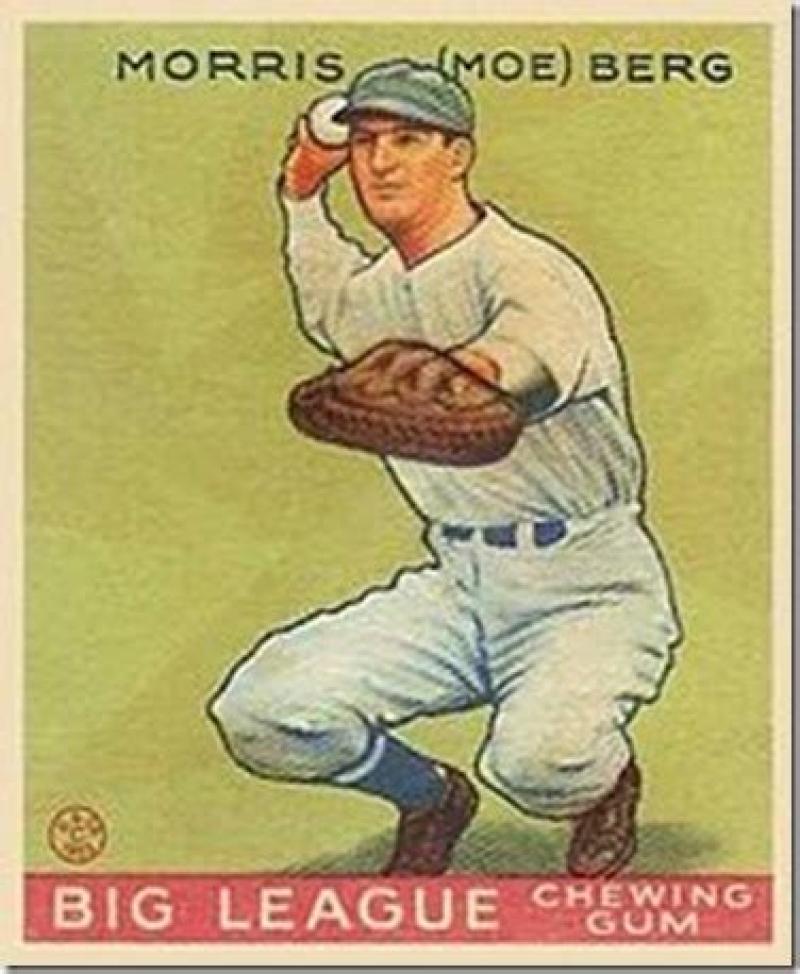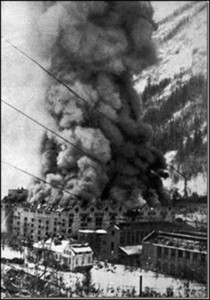This is a Great True Story

BUZZ NOTE: This should be baseball season time, so here is a story about a baseball player who would never have qualified as a player for the Cooperstown Hall of Fame, but something of his adorns that sanctuary that makes him as famous, and maybe more, than a World Series Ring.
This is a Great True Story
When baseball greats Babe Ruth and Lou Gehrig went on tour in baseball-crazy Japan in 1934, some fans wondered why a third-string catcher named Moe Berg was included. Although he played with five major-league teams from 1923 to 1939, he was a very mediocre ball player. But Moe was regarded as the brainiest ballplayer of all time.
In fact Casey Stengel once said: "That is the strangest man ever to play baseball."
When all the baseball stars went to Japan, Moe Berg went with them and many people wondered why he went with "the team."
.
.
.
.
.
.
.
.
.
.
.
.
.
.
.
.
.
.
.
.
.
.
.
.
.
Lou Gehrig and Babe Ruth
The answer was simple: Moe Berg was a United States spy, working undercover
with the CIA. Moe spoke 15 languages - including Japanese. And he had two loves: baseball
and spying. In Tokyo, garbed in a kimono, Berg took flowers to the daughter of an
American diplomat being treated in St. Luke's Hospital - the tallest building in the Japanese capital.
He never delivered the flowers. The ball-player ascended to the hospital roof
and filmed key features: the harbor, military installations, railway
yards, etc. Eight years later, General Jimmy Doolittle studied Berg's
films in planning his spectacular raid on Tokyo.
.
.
.
.
.
.
.
.
.
..
.
.
.
.
.
.
.
.
.
.
.
.
'
.
.
Moe Berg
His father disapproved of his baseball career and never once watched his son
play. In Barringer High School, Moe learned Latin, Greek and French. Moe
read at least 10 newspapers every day.
He graduated magna cum laude from Princeton - having added Spanish, Italian,
German and Sanskrit to his linguistic quiver. During further studies at
the Sorbonne, in Paris, and Columbia Law School, he picked up Japanese,
Chinese, Korean, Indian, Arabic, Portuguese and Hungarian - 15 languages
in all, plus some regional dialects.
While playing baseball for Princeton University, Moe Berg would describe plays
in Latin or Sanskrit.
.
.
.
..
.
Tito's partisans
.
During World War II, Moe was parachuted into Yugoslavia to assess the value to
the war effort of the two groups of partisans there.
He reported back that Marshall Tito's forces were widely supported by the
people and Winston Churchill ordered all-out support for the
Yugoslav underground fighter, rather than Mihajlovic's Serbians.
The parachute jump at age 41 undoubtedly was a challenge. But there was more
to come in that same year. Berg penetrated German-held Norway, met with members of the underground and located a secret heavy-water plant - part of the Nazis' effort to build an atomic bomb.
His information guided the Royal Air Force in a bombing raid to destroy that plant.
;
.

.
.
.
The R.A.F. destroys the Norwegian heavy
water plant targeted by Moe Berg.
There still remained the question of how far had the Nazis progressed in the
race to build the first Atomic bomb.
If the Nazis were successful, they would win the war. Berg (under the code
name "Remus") was sent to Switzerland to hear leading German physicist
Werner Heisenberg, a Nobel Laureate, lecture and determine if the Nazis
were close to building an A-bomb. Moe managed to slip past the SS guards
at the auditorium, posing as a Swiss graduate student.
The spy carried in his pocket a pistol and a cyanide pill.
If the German indicated the Nazis were close to building a weapon, Berg was
to shoot him - and then swallow the cyanide pill. Moe, sitting
in the front row, determined that the Germans were nowhere near their
goal, so he complimented Heisenberg on his speech and walked him back to his hotel.
'
'
.
.
.
Werner Heisenberg - he blocked the
Nazis from acquiring an atomic bomb.
.
Moe Berg's report was distributed to Britain's Prime Minister, Winston
Churchill, President Franklin D. Roosevelt and key figures in the team
developing the Atomic Bomb. Roosevelt responded: "Give my regards to the catcher."
Most of Germany's leading physicists had been Jewish and had fled the Nazis
mainly to Britain and the United States.
After the war, Moe Berg was awarded the Medal of Freedom - America's highest
honor for a civilian in wartime.
But Berg refused to accept it, because he couldn't tell people about his
exploits. After his death, his sister accepted the medal. It now hangs in the Baseball
Hall of Fame, in Cooperstown.
Presidential Medal of Freedom:
the highest award given to civilians during
wartime.
Moe Berg's baseball card is the only card on display
at the CIA Headquarters in Washington, DC.
Tags
Who is online
46 visitors

My family and I became baseball fans once the Blue Jays came to Toronto - we had season's tickets for many years, and became such rabid fans of baseball that the four of us made the pilgrimage to Cooperstown in the mid-1980s, so I probably saw Moe Berg's medal since we toured the shrine, Baseball's Hall of Fame.
Among our members here, who else has made that pilgrimage?
I have. Around '92 or '93, I think.
cool story.
In 1978 I took my three sons to Lake George NY on vacation. All of us were avid baseball fans so we decided to go to Cooperstown to visit the Hall of Fame, we found Cooperstown a charming town and were fascinated by the Hall of Fame. There so much to see of interest we stayed in Cooperstown for 3 days spending many hours at the HOF and at the baseball library.
My youngest son was determined to be a major league ballplayer after that. Unfortunately, after spending three years playing AA ball he came to realize he didn't have the talent to make it to the majors but still was determined to have a career in baseball so he went to umpire school. After nine years umpiring minor league baseball he was called up to the major leagues to umpire in the American League. He's now been an MLB umpire for 19 years making a darn good living. The highlights of his career were umpiring in 4 World Series, all of this probably wouldn't have happened if we hadn't gone to the HOF.
Baseball has been very very good to him LOL
Home plate ump, base ump or field? I just watched again the movie "The Natural" and got the itch of wanting to see a game again.
A little baseball history. My most exciting moment in all of sports was in the stands when Joe Carter hit the line drive homer to the left field stands to win the Blue Jays' second of their back to back World Series. There was a fan appreciation day following, and I will recall forever Joe's words - "Last year we did it for Cito (Cito Gaston, their manager) and this time it was for Paul." (Paul Molitor who had just joined the Jays for a chance to win the ring that he deserved for years but had never won). The Jays were down one run at the bottom of the 9th, and Paul was the second Jay on base when Joe hit the ball, so it was actually Paul whose crossing the plate was the winning run. A.Mac, a Phillies fan, doesn't appreciate the story.
That's a good story to have in your memory bank Buzz.
In MLB an umpire crew has four umpires. home plate calling balls and strikes, 1st, 2nd, and 3rd base umpires. The 3rd and 1st base umpires call a ball fair or foul hit to the outfield when in question. Umpires rotate positions in each game they work. In Major League Baseball, all playoff levels including the World Series use six umpires adding a left-field and right-field umpire.
In regular-season games, an umpiring crew of four rotates so that each umpire in the crew works each position, including plate umpire, an equal number of games.
Never have been to the Hall of Fame, but I've heard this story before and it's absolutely true with only one small mistake in terminology by the author.
Moe Berg never worked for the CIA since it didn't exist until 1949. The outfit he worked for would have been either State Department Intelligence or the OSS or both.
Technically correct, but because of this:
President Franklin D. Roosevelt established the Office of Strategic Services (OSS) , the forerunner to today’s CIA, and appointed New York lawyer and World War I hero General William J. Donovan to head the fledgling agency.
The story was written in present time, so the reference was to the present time existing name of the OSS that he served under.
Yep. I've studied some of Donovan's methods and Berg was exactly the kind of guy that he looked for to be an agent. Particularly regarding the fact that he had a ready made cover and had what it took to carry out such missions without losing his nerve.
During the 60's, there was a TV series called I Spy, I believe it starred Robert Culp and Bill Cosby, that used essentially the same type of cover for the agents. Wow, art really does imitate life.
I recall that TV series. Having watched a lot of movies, I;ve actually been saying that life imitates art. There have been a lot of occurances like that. My prime example is Dick Tracy's watch phone - a 7 year old girl, the daughter of my doctor friend here, was wearing a real one. But I'm not just talking about objects, but things happening and what people are doing.
My husband was hooked on these kind of stories, especially if it had anything to do with sports/military/covert operatives and I seem to recall him mentioning Mr. Berg. He hit the trifecta with this guy.
An unsung hero.
A salute to you Moe.
Great story Buzz.
True heroes always seem humble.